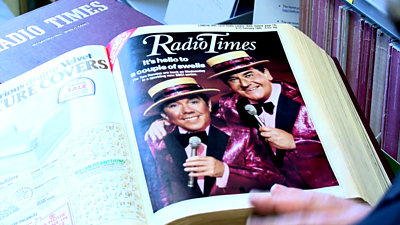Three years ago now the R&D department founded a dedicated team looking at research to support the archives of the Βι¶ΉΤΌΕΔ. Based around core long term projects such as , the group has expanded its portfolio of active projects to cover every element of archives technology, from to . At the same time the Βι¶ΉΤΌΕΔ's own archive has been transformed by massive programmes of migration, and the ongoing evolution of the broadcast environment, not to mention an increased appreciation of the value of archives as public resources.

Here in R&D we wanted to give the story of this archive team a full showing, so we have produced a film in six installments, which is in total some 45 minutes long. So, please join Alex Mansfield as he introduces us to the challenge of "Opening the Archive"
In part two we look at the key challenges addressed by the 'preservation' work of R&D and the Βι¶ΉΤΌΕΔ Information & Archives teams. With interviews from Dr Richard Wright, Adrian Williams of I&A and others, Alex gets to the bottom of the latest technologies being used to ensure that the critical challenge of obsolescence is handled, and handled effectively and efficiency. With huge files, and critical quality checks essential to preserving the legacy of the archive, the best efforts of engineers and archivists are being applied to saving this content for the future.
In this installment we take a look at the need to not just address the challenges of the past, but to also ensure the future resilience of the archive. As we increasingly move content in the archive off the earlier generations of analogue and discrete digital storage, and into digital mass storage, R&D and colleagues across the Βι¶ΉΤΌΕΔ are developing strategies to deal with the novel problems that this new approach to storage throws up. Here we see just how complex this future platform for the archive is proving to be.
Next, we look at the strategic question: what is the modern archive for? It's looking at these core fundamental questions, and how they change as we move more and more into a digital environment, that is letting the Βι¶ΉΤΌΕΔ archive plan a future for its holdings and its services.
Alex introduces us to the complexities and challenges of metadata. From the written archives come a lifetime's worth of Radio Times back copies, which Bill Thompson ex plains are in fact crucial repositories of historical information about broadcasting in the UK. And back in the archives themselves, Alex waxes lyrical on the nature of one of the finest recordings within the Βι¶ΉΤΌΕΔ's extensive collection.
Finally, we take an in depth look at the advanced work exploring new kinds of metadata. Essential for finding content in the digital era, metadata is often unavailable or hard to work with for older archive material. By using advanced digital analysis techniques, and harnessing the capabilities of hundreds of human volunteers, the archive R&D team is developing tools that will keep the treasures of the archive at the fingertips of program makers and, hopefully, the public, for years to come.
Huge thanks to Alex Mansfield, erstwhile producer of such shows as Material World on Radio 4, for his great work in presenting these films for us. And thanks again to our camera op, director and editor, the estimable David Allen.
